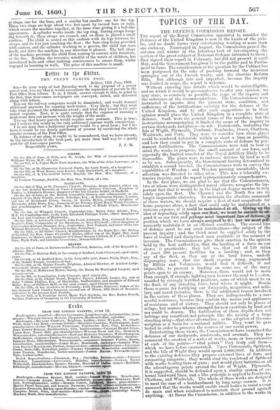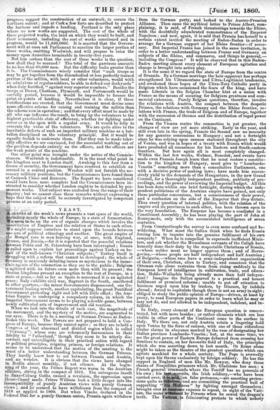TOPICS OF THE DAY.
THE DEFENCE COMMISSION REPORT.
THE report of the Royal Commission appointed to consider the Defences of the United Kingdom is now in the hands of the pub- lic, and no doubt forms very entertaining reading at more than one embassy. Nominated in August, the Commission passed the autumn and winter in the laborious task of investigating the section of the great subject of National Defence intrusted to them ; they signed their report in February, but did not present it until May, and the Government has given it to the public and to Parlia- ment in June. The consideration of the question by the Cabinet has been postponed for the sake of pushing forward the measures springing out of the French treaty, and the abortive Reform Bills. But although -late and imperfect, because the inquiry was limited iu scope, the report is welcome. Without entering into details which would be unintelligible, and on which it would be presumptuous to offer any opinion, we may state, as concisely as possible, the scope of the inquiry and the substance of the recommendations. The Commissioners were instructed to inquire into the present state, condition, and sufficiency of the fortifications existing for the defence of the United Kingdom, and to offer such suggestions as in their opinion would place the United Kingdom in a complete state of defence. Such were the general terms of the mandate ; but the instructions accompanying it limited the scope of the inquiry to certain dockyards and plices—to wit : Portsmouth, including the Isle of Wight, Plymouth, Portland, Pembroke, Dover, Chatham, Woolwich, and Cork. They were to consider how these places could be rendered defensible within as short a time as possible, and how they could be put in a complete state of defence by per- manent fortifications. The Commissioners were told to bear in mind the works in progress, the small amount of our force, and especially the limited number of the Royal Artillery likely to be disposable. The plans were to embrace defence by land as well as by sea. Subsequently, the Government having determined to establish a second arsenal, the Commissioners were to survey the capabilities of Weedon ; and Weedon proving unsuitable, their attention was directed to other sites. This was a tolerably ex- tensive inquiry, and the report is proportionately comprehensive. In the first place, we are glad to see that the Commissioners, two of whom were distinguished naval officers, recognize the im- portant fact that it would be in the highest degree unwise to rely solely upon the fleet. The Channel and the North Sea are no longer impassable obstacles. To maintain the absolute command of these waters, we should require a fleet of vast magnitude for home purposes alone, a fleet that could only be maintained at a ruinous expense, if it could be maintained at all. Giving up the idea of depending solely upon our fleet, we must be content to,rtii- gard it as our first and perhaps most important line of defenee,4 position which we have always assigned to it ; but we must pelf manently maintain it in an efficient condition. The second line of defence must be our coast fortifications—the subject of the present inquiry ; and the third must be supplied solely by the force of trained and disciplined men available at the moment of invasion. The Commissioners give their sanction to the opinion held by the best authorities, that the landing of a force on our shores is practicable ; they tell us, that out of 750 miles of coast 300 present facilities for a landing ; and, as they say of the fleet, so they say of the land forces, unduly disparaging none, that our small regular Army, augmented by Militia and Volunteers, would find it difficult, if not impossible, to prevent a landing on some ono of the many points open to an enemy. Moreover, there would not be more than enough, if enough, fighting men to cover the road to London, unaided by strongly fortified positions, some of which must be on the flank of any invading force, land where it might. Beside these reasons for fortifying our dockyards, magazines, and mili- tary and naval factories, there is the additional reason involved in the nature of these places. They are indispensable to a suc- cessful resistance, because they contain the means and appliances of resistance and of victory. They should not only be places of refuge, but sources whence strenith for new exertions by land and sea could be drawn. The fortification of these depots does not infringe any constitutional principle like the raising of a large standing army—that other alternative ; or the adoption of the con- scription as a basis for a national militia. They must be pro- tected in order to preserve the sources of our naval power.
Entertaining these views, the Commissioners have examined the defences of our dockyards, roadsteads, and arsenals. They re- commend the erection of a series of works, more or less extensive at each of the points—" vital points " they truly call them— which we have before enumerated. Upon Portsmouth, Spithead, and the Isle of Wight they would spend 2,800,000/. In addition to the existing defences they propose external lines of forts and connecting ramparts ; they would stud the roadstead of Spithead with works bearing tiers of guns ; and would plant batteries on all the advantageous points around the Isle of Wight. Plymouth, it is suggested, should be defended upon a similar system of ex-
ternal landward lines, and a like principle is applied to Pembroke, Chatham, and Woolwich. The whole of these works are designed to meet the case of a bombardment by long range cannon. It is assumed that the works would enable small bodies to resist a coup de main and when reinforced to maintain their ground against anything. At Dover the Commission, in addition to the works in
northern salient; and at Cork a few forts are described to protect the harbour and impede a landing. Portland is the only place where no new works are suggested. The cost of the whole of these projected works, the land on which they would be built, and their armament, including the cost of works sanctioned and in progress, would be 11,860,0001. It is asserted that the Govern- ment will at once ask Parliament to sanction the larger portion of these works, omitting Woolwich, and will propose to raise the money upon Annuities terminable in twenty-five years. Not less serious than the cost of these works is the question, how shall they be manned ? The total of the garrisons amounts to no loss than 69,000 men. But the difficulty looks greater than it is. The Commissioners wisely consider that " such troops as may be got together from the disembodied or less perfectly trained ,.portion of the militia, with local or other volunteers, would with an admixture of regularaoldiers, be able to defend our dockyards" when duly fortified, " against very superior numbers." Besides the troops at Dover, Chatham, Plymouth, and Portsmouth would be usefully posted, because it would be impossible to foresee the .point or points of landing. Nevertheless it is clear, if these fortifications are erected, that the Government must devise some more effective scheme for raising and training the militia than the scheme now in operation ; and that every effort must be made by all who ean influence the result, to bring up the volunteers to the highest practicable state of efficiency, whether for fighting under cover or in the open with a regular army. It would be folly to overrate the value of the volunteers. We are quite alive to the inevitable defects of such an imperfect military machine as a bat- talion disciplined on the voluntary principle. But it would be equally foolish to underrate them. That they can be made toler- ably effective we are convinced, but the successful working out of Abe problem depends entirely on the officers, and the officers are the weak points of the machine.
One other point was brought under the notice of the Commis- sioners. Woolwich is indefensible. It is the moat vital point in the kingdom next to London itself. Awaking to this fact from a dream of security, the Government have resolved to establish an arsenal in a central position. Weedon will not furnish the ne- cessary military positions, but the Commissioners have found them at Cannock Chase and Runcorn. The Report we have considered would have been more complete had the Commissioners been in- structed to consider whether London ought to be defended by per- manent works. That subject was excluded from the range of their inquiry ; but we cannot close these remarks without expressing a hope that the subject will be seriously investigated by competent persons at an early period.



























 Previous page
Previous page